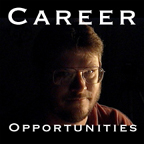Podcast: Play in new window | Download
Subscribe: Apple Podcasts | RSS
 Develop specialized skills and intuition to avoid being replaced by technology
Develop specialized skills and intuition to avoid being replaced by technology
By Douglas E. Welch
Listen: Develop specialized skills and intuition to avoid being replaced by technology
Get daily career tips on Twitter, Friendfeed and now, in video, on Seesmic.
Working with my computer consulting clients day-after-day, I find that there is a lot of my work that could be done by a computer. In some ways, I am little more than a flesh and bones translator for information that can be readily found in online search engines or manufacturer’s support sites. I understand that my clients find it easier to work with me. I know how and where to search Google to find the best answers and how to translate sometimes confusing instructions into solid solutions. Thank goodness they find value in that or I might have to go looking for another line of work. Still, this type of work does remind me that if there is a way to systematize your work and your knowledge so that the average person can use it, your job will eventually be in danger.
Let’s take my own work as an example again. While it might be somewhat intimidating for people to search for support information on the Internet, it is only going to get easier. Simply searching YouTube for demonstrations of Microsoft Office 2007 turns up a host of excellent screencasts detailing various operations. Finding such information, and putting it to use, is only going to become easier as time goes on. In some cases, it is going to become so easy that my clients will no longer need me to hunt down information for them. They will simply be able to do it themselves.
I am sure you can find similar analogies in your own work. Are you running reports or creating charts for others? Do you manage large project management Gantt charts? Do you handle high-end printing for your company or department? Tasks such as these are destined to move beyond the need for specialists. Look at the spreadsheets, word processing and research tasks that were once the private domain of specialists. Now most anyone can meet their basic needs themselves. Sure, they call on specialists for more complicated tasks, but the scope of the specialists work has been reduced to a fraction of what it once was.
So, what do you do if you find your work being systematized? How do you prevent yourself from being replaced by a computer? There are a number of ways. First, take a deep look at your work and see where you are adding value, above and beyond simply delivering information. If you are creating charts and graphics for your department, what creative abilities do you bring to that task? How do you make the charts better, clearer, more representative of the raw data? Something as simple as knowing which colors are the easiest to read can make a large difference. This is the type of knowledge that comes from long practice and study, and can’t necessarily be coded into a program. These are the type of skills you want to focus on.
Second, anything that requires you to use your intuition is also a great skill to cultivate. Dealing directly with human beings is one skill that computers will not acquire for many decades to come. It is often best to have human beings dealing with human beings, especially in areas that deal with subjectivity, creativity and human nature. While someone might be able to create a business card from a template on their own, designing an entire brand look and feel still calls for the intuitive skills of an artist. In my own case, solving some computer problems requires more intuition than hard data. Using the scientific method and my experience, I can solve issues that might seem intractable to others. In what ways do you use your intuition to create solutions? Like the foundry worker who knows when metal is ready by its color and movement, what information do you just “know?” Again, these are the areas where you should focus your attention.
Every job, every career, finds automation nipping at is heels. Technology continues improving by leaps and bounds each year, but there are still complex, intuitive skills that remain outside its abilities. If you focus on skills that can’t be systematized and skills that make the best use of your intuition, you will find that your career will continue to grow. If, on the other hand, you specialize only in static information and tasks that can be automated, you risk being replaced by technology, like so many workers before you.
Join me on these networks:
Follow Douglas on FriendFeed | Follow Douglas on Twitter | Douglas on MySpace | Douglas on Facebook | Douglas on LinkedIn
Become a Facebook Fan of Career Opportunities
Support Career Opportunities:
One time:
Monthly ($2):
iTunes Review | Career-Op Forums | Digg.com | Podcast Alley | Reader/Listener Line @ 818-804-5049
Technorati Tags: career, job, jobs, work, workplace, podcast, podcasting, technology, high-tech, employment

